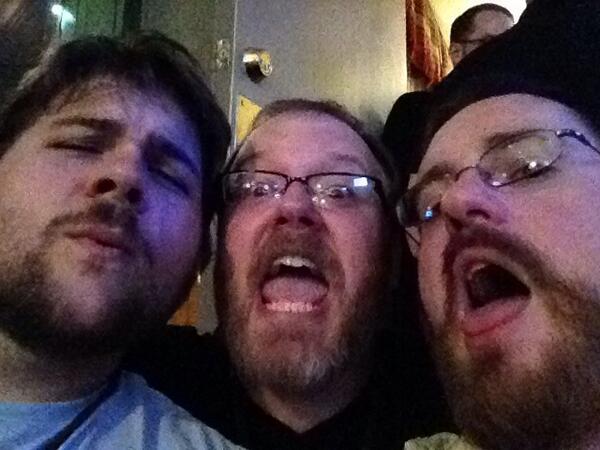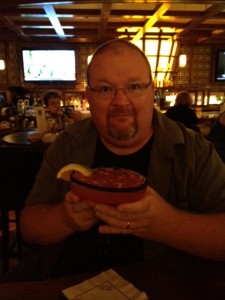As you could likely conclude from any convention that could give me a three-day hangover, WorldCon 2013 was very good to me. And as such, I have mostly good things to say about it, having just returned from it on Sunday.
Was it a great experience?
Yes.
Was it an awesome opportunity to see my good friends Kevin Hearne, Brian McClellan, Scott Lynch, Myke Cole and Wesley Chu?
Yes.
Was it a great atmosphere to meet new friends like Chuck Wendig, Justin Landon, Andrea Phillips and Jason M. Hough?
Yes.
Was it excellent to meet editors like Devi Pillai and Will Hinton?
Yes.
Was it a great opportunity for taking pictures of Kevin Hearne looking bewildered and slightly intimidated at the size of his margarita?
You better believe it.
Was it an excellent opportunity to grow my business as a writer, attract new readers and further my career by interacting with fans?
…well.
Other people have touched on this in their write-ups of the con itself, but common criticisms regarding WorldCon have been that it is hostile to younger readers and fans, it’s not a very welcoming air, it contains an air of elitism about it and it generally prefers to occupy the same spot it has for years now. While there have been many less savory terms thrown about to describe it, many people brand WorldCon as “old.”
I hesitate to use that term flippantly, since I don’t like the implication that older readers have no place in readership or conventions. Many of my fondest readers are older and I would quite prefer them to feel included and welcome in reading my books and those of authors they love.
What might be a better term to describe WorldCon is “established.” It has been around for awhile, it has seen no particular need to change, it has a built-in community and tradition and it can’t be arsed to go looking for new blood. It’s a con that started by sitting around, talking about the things that they love and prefers to keep sitting around, talking about the things they love, heedless of the fact that no one really knows what a “fanzine” is anymore.
This is all fine, really. It’s not my place to dictate terms to a con and I certainly enjoy the service they provide on a personal level. But on a professional level, this just won’t do me a lot of good.
I’ve made no secret that Phoenix Comicon is my favorite convention. Not just because it’s my home con. Not just because I know a lot of people there. Not just because I get a little smile when local fans come to see me year after year. Not just because I once met a girl dressed as a scary nurse from Silent Hill and I was intimidated and I think I might be kind of into that is that bad.
But because Comicon targets a big section of my readership: a subset of burgeoning readers who come to novels via other mediums like comics and video games. A readership I am tentatively calling “book-curious.”
The real advantage of a place like Comicon and other mixed-media events is that it comes at the advent of geek culture beginning to bloom. Whereas before we were vague tribes (and I’m not saying there isn’t a fair degree of tribalism going on in it), we are at least more inclusive now, resulting in people like Felicia Day who are across-the-board geeks who like games, books, comics and more. The result is that you have a lot of mingling between the various interests: comic readers and video gamers are slowly peeking their noses out of their holes, inhaling softly the scent of overwrought prose and elaborate descriptions of feast scenes.
And they have found the odor intoxicating.
A lot of my readers are people who are just sort of starting to sniff out the fantasy genre in earnest. A lot of my readers are people who are excited about the prospect of new authors coming out before them. A lot of my readers are people who found fantasy novels via other means and have become readers themselves.
I meet a lot of these people at Comicon and it’s really, really good. Making sure these people have a positive experience with authors they’re curious about means that they will be unrepentantly geeky about it. Which I loves.
At places like WorldCon, though, I mostly see people still talking about the authors they once loved. That’s fine. I like Heinlein, too. But as a new, often struggling author, this sort of environment is not really conducive to spreading my work like a disease.
I suppose this must all sound frightfully mercenary, talking about expansion and occupation as though readers are a commodity. The truth is that all authors think in business terms at least a little. We kind of have to if we don’t want to stop writing and, you know, die in poverty. But these are typically at the back of our minds. At the front is the sheer joy of being a geek, geeking out about what we’re excited about in the hopes of spreading and absorbing each other’s enthusiasm.
I suppose that last metaphor must have sounded a little more disturbing, but you get the idea.
I’m not going to speculate on the future of WorldCon. Plenty of other people do that enough already. But what I do think is that we’re going to start seeing more cons embracing the idea of mixed media and a coalescing of tribes. And for authors, this is a good thing. This is where we can start branching out creatively, reaching other communities as they sweatily brush against each other in crowded hallways (that’s just another metaphor, by the way, you shouldn’t actually be grabbing people in hallways, especially if they’re sweaty).
Ultimately, WorldCon is an excellent con, loads of fun, a nice place to go.
But it’s not my con.


Hey, man, no honorable mention for me?
That’s it, you’re off my Christmas Card list.
Seriously good post, though.
I am INCREDIBLY OLD and snooty and yet I read your books, Sam.
And a fanzine nowadays is like the one I write for; you know, the HUGO WINNING ONE that is a huge website. 🙂
Seriously, I think that a lot of this makes sense, even as it makes the literary elitist in me uneasy. I think you hit the target with “established” and what that idea entails. Core Worldconners like the con the way it is and are resistant to some if not most changes. It won’t change until some new blood gets into the process of forming and running the cons.
Great post, Sam! Looks like it was a lot of fun. I was hoping to get to this one, but couldn’t (and I’m still bitter about it – grrr.)
It is sad that the demographic seems so static at Worldcon. Sadder still, is that I realized that I’m actually old now – probably exactly the demographic that was the most in attendance. So, thanks for reminding me that I’m really old and part of the establishment. Yikes.
Seriously, though, they should really start to include YA stuff, and not just as a category for the Hugos, but really play it up. YA has some incredibly voracious audiences (my son being part of that), and having a few of the “stars” of that community would probably go a long way toward infusing a younger demographic. A demographic that is on the lookout for where to go for their literary fix next. Probably would not be a huge gamble for Worldcon to jump on that train. Not doing that might be a gamble.
As far as the mixing of the tribes thing, I do think that’s a good idea – I love Phoenix Comicon as well (It’s one of the only ones I’ve been to) – but I kinda (selfishly) want it to stay about books and writing. I love comics, movies, and games, but, as a reader and aspiring writer, I love books most of all, and I think it’s kind of cool to have a con that focuses on just that aspect. Ugh…I guess I’m part of the problem.
Well, hopefully I’ll get to attend one someday and see that positive changes were made, whatever they will be, and younger folks aplenty in attendance.
That’s why I hate the idea of calling it an “old” con. I love my readers, no matter what age they are. But for what it’s worth, I think there’s a big difference between an older reader and part of the establishment. You, Doug, are an enthusiastic supporter and an eager reader and I thank you wholeheartedly for your patronage and support and I have no doubts that you’d support a new author just as vigorously if you liked their stuff, as well.
My career has been fraught with terribly kind people who are older, more entrenched authors. John Scalzi is one of the genre’s darlings and also one of my very good friends in genre. He’s been nothing but nice to me and dozens of other younger, newer writers. If we can translate that enthusiasm to fans, we’re onto something big.
Hey, at least you got to have a discussion with Jen and I in a mysterious hallway! That’s gotta count for something 🙂
I am going to link the hell out of that when it’s up.
I go to both Phoenix Comicon and Worldcon. It’s been a blast watching PHXCC go from a few thousand to topping 50K this year. But Worldcon is my home convention. I’m just glad that it is there for me and that there are a myriad of other cons for other folks.